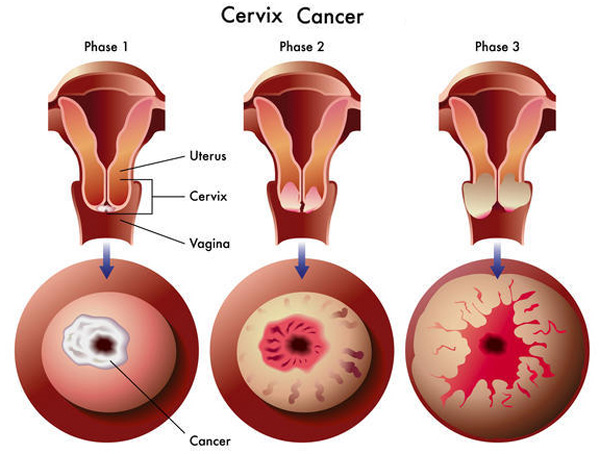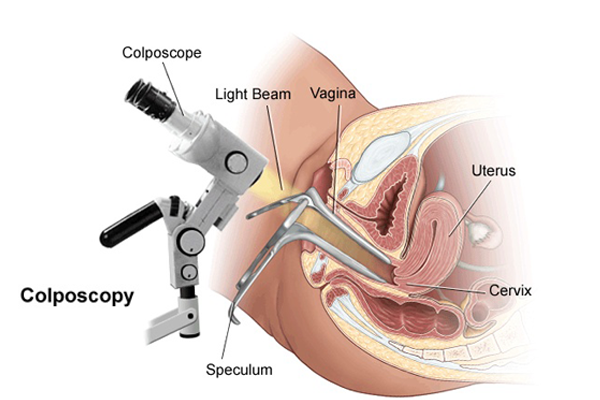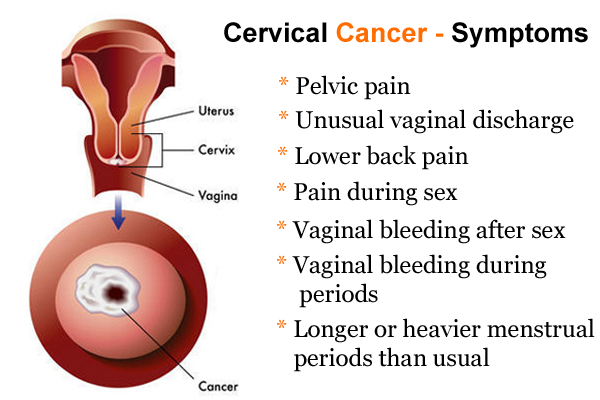Cervical cancer is one of the most common cancers attacking women across the globe. It is the form of cancer caused by some malignant cells in the cervical tissues. Cervix is one of the organs in the female reproductive system, the others being uterus, ovaries, vagina, fallopian tubes. Cervix can be defined as the lower part of the uterus that meets the vagina. It is made up of numerous microscopic cells. The upper part of the cervix is lined with similar cells that line the uterus; and the lower part is lined with similar cells that line the vagina. The area where these two kinds of cells get merged is the site for most cervical cancer cases. 
Cervical cancer is the most common cancer among women in India. Usually women over 30 fall prey to this disease. Women below 25 are at very low risk of developing this cancer. So women, who are above 25 and are sexually active, must be aware of this cancer. Some key points regarding the diagnosis, risk factors, symptoms and prevention of cervical cancer are discussed below.
Diagnosis:
Whether a woman is having cervical cancer or may develop cancer in the course of time can be known by doctors once they perform some tests.
Usually the following procedures are followed:
-
Physical test:
Your doctor will check for signs of disease, something that may seem unusual and will also enquire about your past illnesses, health habits, treatments and medicines, if you are taking any.
-
Pelvic exam:
During this exam, your pelvic area consisting of cervix, vagina, ovaries, fallopian tubes, rectum etc. are examined. A pap test of the cervix may be done.
-
Pap smear test:
It is the most common test to diagnose cervical cancer. This test is done to collect cells from the surface of vagina and cervix. Later these cells are examined under a microscope to find out whether these are abnormal.
-
Endocervical curettage:
The process of collecting tissues or cells from the cervical canal is known as endocervical curettage. These cells or tissue samples are also examined under the microscope.
-
Colposcopy:
Colposcope is a magnifying instrument used to find out whether there are abnormal areas in the cervix or vagina.
 Sometimes endocervical curettage is also done during colposcopy.
Sometimes endocervical curettage is also done during colposcopy. -
Biopsy:
Depending on the results of pap smear test, a doctor may opt for biopsy where a tissue sample is cut from cervix and examined under a microscope to find out signs of cervical cancer.
-
Human Papillomavirus test:
HPV test is done to collect cells from the cervix; again DNA or RNA from the cells may be checked to know the existence of HPV infection. This infection can be linked to cervical cancer.
-
Computerized Tomography & Magnetic Resonance Imaging:
CT scans and MRI may be done by doctors to know whether the cancer has spread to other organs and tissues.
Symptoms:
It is very unfortunate to learn that there are no major signs and symptoms of cervical cancer. This cancer, at its very early stage may not have any symptom. Once the cancer advances, a woman might face some issues like:
- Unusual vaginal discharge
- Pelvic pain
- Vaginal bleeding after sex
- Vaginal bleeding between periods
- Pain during sex
- Lower back pain
- Longer or heavier menstrual periods than usual
 The reason behind all these symptoms can be other conditions like infections. It may not be cervical cancer every time. Whatever may be the case, you need to visit the physician immediately, even if you went through cervical cancer tests, earlier. It may be a small infection, which needs to be treated right away. And if it’s cancer, earlier detection will better your chances of getting treated effectively.
The reason behind all these symptoms can be other conditions like infections. It may not be cervical cancer every time. Whatever may be the case, you need to visit the physician immediately, even if you went through cervical cancer tests, earlier. It may be a small infection, which needs to be treated right away. And if it’s cancer, earlier detection will better your chances of getting treated effectively.
Since there are no fixed signs and symptoms of cervical cancer, you must educate yourself about the risk factors causing this cancer.
Risk Factors:
Having a risk factor or many risk factors does not mean a person will have any particular disease. It means that a person with these factors may have this disease. Again not having these risk factors does not validate the fact that the person will not have the disease.
Similarly, a woman with the following risk factors may or may not have cervical cancer. But knowledge about these is necessary, as you can change or avoid some factors.
- Human Papillomavirus (HPV) Infection: HPV is the commonly known cause of cervical cancer. Most of the times, cervical cancer is caused by the infection of the cervix with HPV, which is a group of more than 150 related viruses. Infections with HPV can cause conditions like genital warts; but usually there are no symptoms. This is the reason that most of the women are unaware of the transmission of the virus. Some high risk HPV infections cause cell changes on the cervix leading to the cancer, even 10 to 20 years after the infection.
- Sex: Any woman who is sexually active is at risk of developing cervical cancer. But a woman having multiple sexual partners and also one who had her first sexual intercourse at a very young age may be particularly bearing this cancer.
- Using oral contraceptives
- Giving birth to a number of children
- Having a weakened immune system
- Being overweight
- Smoking
- Having chlamydia infection that attacks the female reproductive system and is spread by sexual contact.
Prevention:

Cervical cancer can be prevented by screenings. If you are above 20 yrs and sexually active, you must go for screening every 3 years. If you are diagnosed with any abnormalities during your last screening, you might be screened every 1 year or as advised by your doctor. In many countries across the globe, vaccinations are available. A woman between 9 and 45 yrs of age can opt for vaccination. Chances of prevention are better with early vaccination.
So consult with your doctor, go for tests if required and take vaccination early in life to prevent this deadly disease.
I have a common sign..of cervical cancer but I haven’t yet a papmers
I’m having white discharge while urine and having very much itching and pain in vagina. Does I need a medical test